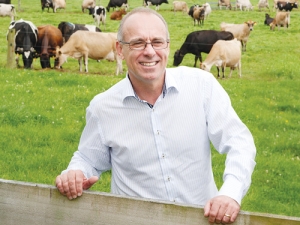Leadership through strong governance is critical for farmers, and the sector more broadly, if the dairy industry is to seize the opportunities of the decades ahead.
That was the message from Rabobank director and former Fonterra chair Sir Henry van der Heyden to the delegates at this year's Australian Dairy Conference.
A fourth generation dairy farmer, van der Heyden and his wife started out as a sharefarmers and have grown the business to have dairy investments in New Zealand's North and South Islands, and in the US and South America.
"Governance is about creating shareholder value through growth," he said. "I'm only involved in businesses where I can pull that lever for growth; it's an important part of the value creation chain."
Van der Heyden says the Australian and NZ dairy industries can no longer rest on their natural advantages, and though there are huge opportunities the landscape is highly competitive.
"Consumers want a Rolls Royce but only want to pay for a Skoda," he says. "We have to deliver more and more, cheaper and cheaper and at the same time try to create value.
"We are being squeezed: we cannot stand still, we cannot do the same... We have to produce more, produce it better, at a higher quality, with lower inputs of time, resources and costs."
He said leadership, including at farm level, was the key to meeting this challenge. "The first part of successful leadership is lifting governance," he said.
Sound business management, and accountability to a board, was important if farm businesses were to maximise value and grow.
"Having a board and a three-five year plan keeps the banks happy and can save money and minimise risk."
He said a board should be made up of people already successful and truly able to challenge what you are doing onfarm.
"You need people at a strategic level to bring their knowledge and experience to the business. It may be monthly, it may only be quarterly, but this can give you ideas, energy and momentum to drive your business."
He said boards could add value by looking to the bigger picture and focussing on business objectives; separating governance from representation is the key.
"There's always a blur when you sit on a cooperative board: are you there as a governor or are you there representing farmers?
"One of the best innovations when we formed Fonterra was to separate those two roles. So much value got created in that separation alone.
"When you are on the board as a governor your focus has to be much more on the global marketplace, while the shareholder councillors represent the voice of the farmers."
He says diversity of opinion, background, age and gender were also critical to creating successful leadership. "You cannot dismiss capability, but gender and diversity are very important."
Van der Heyden also highlighted Rabobank's executive development programme as a valuable tool for farmers to develop their business management skills.


















